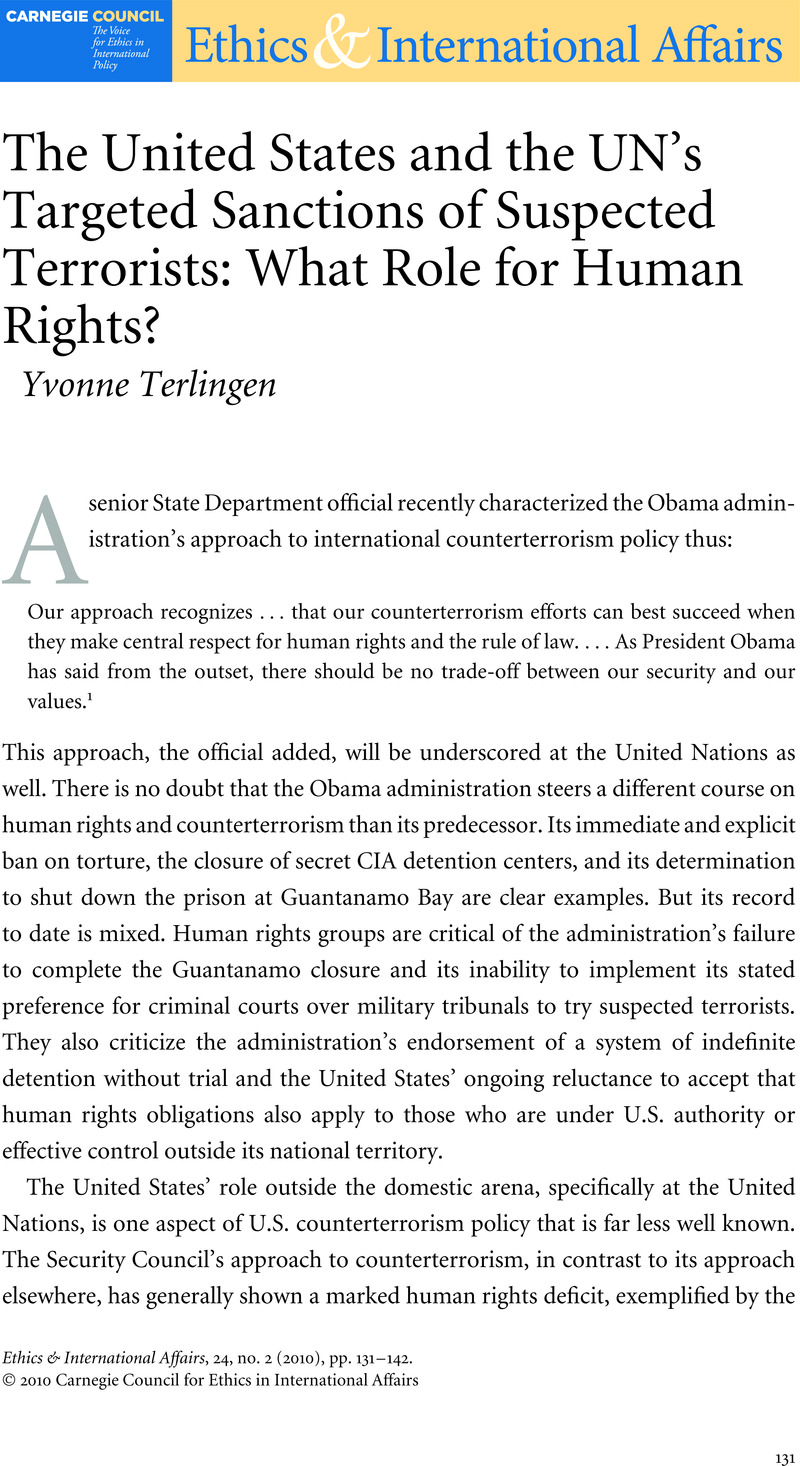Published online by Cambridge University Press: 25 March 2011

1 Ambassador Daniel Benjamin, Coordinator for Counterterrorism at the U.S. Department of State, in an address on International Counterterrorism Policy in the Obama Administration at the International Peace Institute, New York, March 1, 2010; available at http:\\www.ipacademy.org/events/speakers/details/190-us-official-no-trade-off-between-our-security-and-our-values.html.
2 “Assessing Damage, Urging Action: Report of the Eminent Jurists Panel on Terrorism, Counterterrorism and Human Rights,” International Commission of Jurists, 2009, p. 124. See also “Security and Human Rights, Counter-Terrorism and the United Nations,” Amnesty International, IOR 40/019/2008, September 2008, p. 27, citing examples of the Anti-Terrorism Law passed in Ghana in July 2008, reportedly under Security Council pressure, which is perceived to have a negative impact on the rights to free expression and association, and a 2007 amendment to a 2002 law in the Russian Federation that broadens the definition of “extremism” and threatened to restrict and punish the activities of civil society organizations.
3 Security Council Resolutions 1390 (2002), 1526 (2004), 1617 (2005), 1730 (2006), and 1735 (2006) do not mention human rights; Resolutions 1822 (2008) and 1904 (2009) include brief references to human rights.
4 Eric Rosand, Remarks (panel discussion “UN Terrorist Designations and Sanctions: A Fair Process and Effective Regime?”, Center on Global Counterterrorism Cooperation, June 5, 2008).
5 “Report of the United Nations High Commissioner for Human Rights on the Protection of Human Rights and Fundamental Freedoms While Countering Terrorism,” A/HRC/4/88, March 9, 2007, para. 25.
6 UN General Assembly, “2005 World Summit Outcome,” A/RES/60/1, October 24, 2005, para. 109.
7 See Abousfian Abdelrazik and the Minister of Foreign Affairs and the Attorney General of Canada, Federal Court of Canada, Ruling of June 4, 2009; available at http:\\beta.images.theglobeandmail.com/archive/00057/The_Abdelrazik_rulin_57365a.pdf.
8 “Report of the United Nations High Commissioner for Human Rights on the Protection of Human Rights and Fundamental Freedoms While Countering Terrorism,” A/HRC/8/13, June 2, 2008, paras. 47, 50.
9 Court of Justice of the European Communities in Joined Cases C-402/05 P and C-415/05 P, September 3, 2008, Yassin Abdullah Kadi and Al Barakaat International Foundation v. Council of the European Union and Commission of the European Communities; available at eur-lex.europa.eu/LexUriServ/LexUriServ.do?uri= CELEX:62005J0402:EN:HTML.
10 Human Rights Committee, “Views,” Communication no. 1472/2006, adopted at its 94th Session, CCPR/C/94/D/1472/2006, October 2008; available at http:\\issuu.com/i.l.m./docs/human_rights_committee_communication_no._1472-2006.
11 Abousfian Abdelrazik and the Minister of Foreign Affairs and the Attorney General of Canada, Ruling of June 4, 2009 para. 51.
12 Letter from UN Secretary-General Kofi Annan to the President of the Security Council, June 15, 2006, subsequently read into the record by the Legal Counsel on June 22, 2006 (UN Doc.S/PV.5474).
13 Resolution 1822 (2008) had a positive influence on other UN sanctions regimes: some of these measures were then applied to the Somalia sanctions regime (Security Council Resolution 1844, 2008).
14 Discussions with UN member states; see also Eric Rosand, Remarks.
15 UN Security Council, “Tenth Report of the Analytical Support and Sanctions Implementation Monitoring Team Submitted Pursuant to Resolution 1822 (2008) Concerning Al-Qaida and the Taliban and Associated Individuals and Entities,” S/2009/502, October 2, 2009, Summary, paragraphs 41–42 and Annex I.
16 For a list of current UN sanctions regimes, see http:\\www.un.org/sc/committees/.